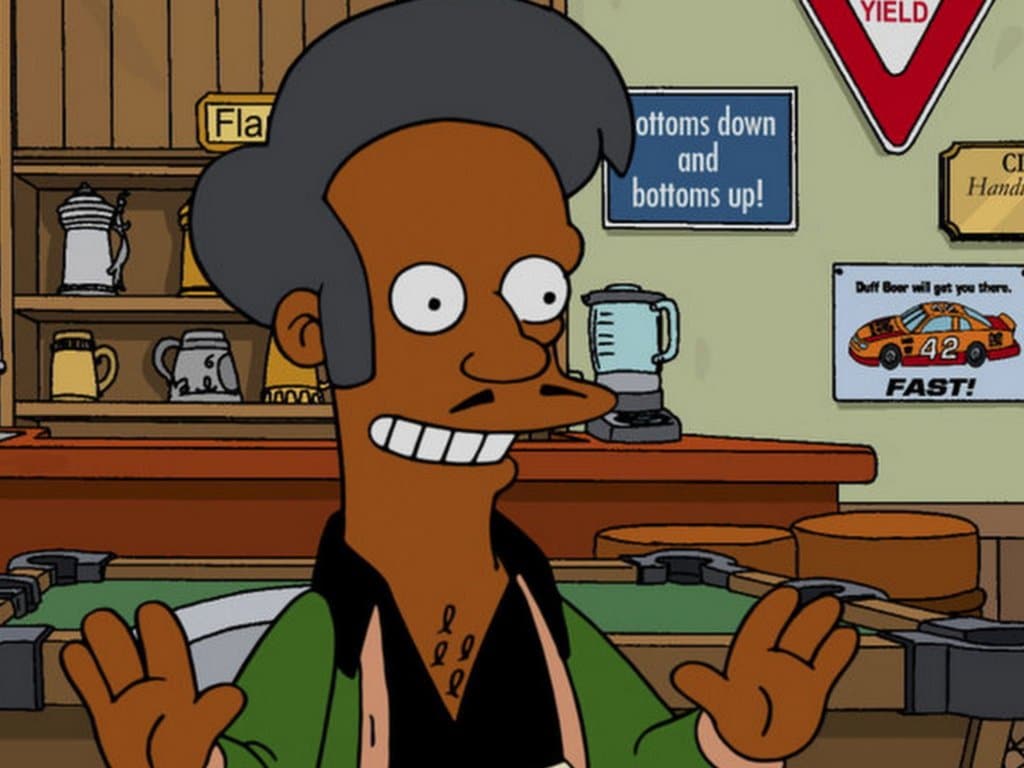The Simpsons aired an episode on April 8 in which it acknowledged and pushed back against the criticism it received over its portrayal of Apu Nahasapeemapetilon, an Indian immigrant character. The portrayal of Apu. who owns a convenience store, was recently condemned by Indian American comedian Hari Kondabalu in his documentary, The Problem with Apu.
In the episode aired on Fox, the mother, Marge, tries to edit a bedtime story, which had racist stereotypes about people of Irish and Latin American descent, for Lisa to make it “inoffensive as a Sunday in Cincinnati.” Her doing so makes the tale pointless, the Simpson kid points out.
“What am I supposed to do?,” the mother, who is exhausted, asks Lisa. The child replies: “It’s hard to say. Something that started decades ago and was applauded and inoffensive, is now politically incorrect. What can you do?”
With this line, Lisa looks at the picture of Apu on her nightstand. The photo carries the text: “Don’t have a cow.” Marge concludes the scene with: “Some things will be dealt with at a later date.”
To this, Lisa adds: “If at all.”
The scene did not go down well with Kondabalu, the maker of the documentary, The Problem with Apu. He wrote on Twitter: “Wow. ‘Politically incorrect’? That’s the takeaway from my movie and the discussion it spared. Man, I really loved the show. This is sad.”
Wow. “Politically Incorrect?” That’s the takeaway from my movie & the discussion it sparked? Man, I really loved this show. This is sad. https://t.co/lYFH5LguEJ
— Hari Kondabolu (@harikondabolu) April 9, 2018
In “The Problem with Apu,” I used Apu & The Simpsons as an entry point into a larger conversation about the representation of marginalized groups & why this is important. The Simpsons response tonight is not a jab at me, but at what many of us consider progress.
— Hari Kondabolu (@harikondabolu) April 9, 2018
Many backed Kondabalu on Twitter.
I think the fact that they put this “argument” in the mouth of Lisa’s character, the character who usually champions the underdogs and is supposed to be the most thoughtful and liberal, is what makes this the most ridiculous (as in worthy of ridicule) and toothless response.
— Wakanda Kamau Bell (@wkamaubell) April 9, 2018
I just finished the #Simpsons episode and ooo boy was it the most tone deaf way to address the #Apu documentary.
— Ivan Pereira (@IvanPer4) April 10, 2018
The way the #simpsons addressed The Problem with #Apu is disheartening and dismissive of the racism faced by Asian and Asian American folks. Acknowledge your privilege and contributions to furthering racial stereotypes, and then DO something.
— Samantha Bissonnette (@sambissonnette) April 10, 2018
However, responses were posted in defense of the show as well:
The #Apu and #Simpsons controversy should remind us that being entitled to one’s outrage does not mean being entitled to an apology. Some might call the Simpsons response “tepid” but that word implies a show must fall over itself addressing something sort of overblown.
— Singe-Froid (@SingeFroid) April 10, 2018
Society expects more of comedians in regard to political correctness than they do of politicians. The world is upside down. I’m still a #simpsons fan doe
— Eric Nimmer ♠ (@nimmthegreat) April 10, 2018
People need to calm down about The Simpsons Apu controversy. There’s no reason to question the experience of this diverse group of writers. pic.twitter.com/OyIx32xwqt
— Nick Jack Pappas (@Pappiness) April 9, 2018
Kondabalu’s documentary featured actors and comics of South Asian descent, including Aziz Ansari, Kal Penn, Maulik Pancholy, Utkarsh Ambudkar, Samrat Chakrabarti, Sakina Jaffrey, Aasif Mandvi and Hasan Minhaj, talking about how the perceived stereotype surrounding Apu affected their lives. They narrated stories of how they were called “Apu” as children or were asked to deliver lines like him during auditions. Apu is voiced by a white man, Hank Azaria.
The documentary talked of the racial stereotyping that South Asians have had to face: the caricatured accent, the arranged marriage, many children and the fact that he runs a convenience store, all at a time when Indians had little to no representation in American media.
“There are accents that by their nature to white-Americans sound funny, period,” Simpsons writer Dana Gould says in a scene in the documentary. “It’s funny because it’s racist,” Kondabolu responds in the film.
Hank Azaria, who had declined to be in the film, had responded to the criticism leveled in the documentary earlier in the year to TMZ website, saying: “I think the documentary makes some really interesting points. It gave us a lot at The Simpsons to think about, and we really are thinking about. And definitely anybody that was hurt or offended by any character or vocal performance, it’s really upsetting that it was upsetting or hurtful to anybody.”
He added: “I think it’s an important conversation, and one definitely worth having. We’re just really still thinking about it. It’s a lot to digest.”
